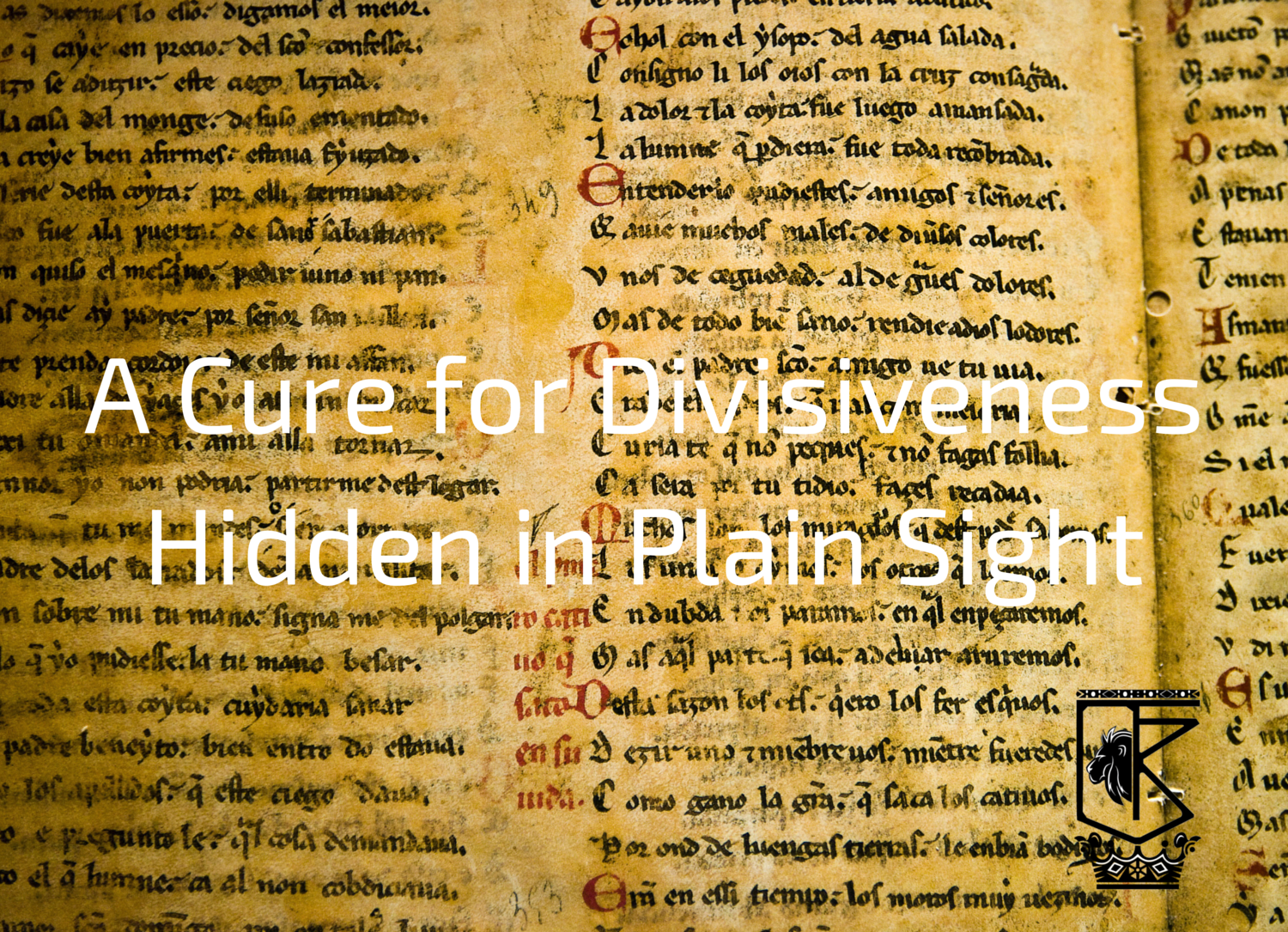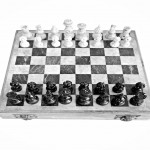Where is the best place to hide something? Directly in front of us, because we quickly assume the thing that’s missing must be far away to be considered “disappeared.” This same idea can be applied to the loaded word, “divisiveness.” This term is chock full of meaning, layers and arouses strong emotion, especially in the political arena. But to the layperson, what does it really mean?
Webster says divisiveness is a process of “causing a lot of disagreement between people and causing them to separate into different groups.” So when we think of the keywords in this definition (disagreement, people, separate, groups, different), our minds may float and make associations about race, social class, an entire sector of people, the 1% vs. the 99% and all other me vs. you scenarios. And since we automatically associate across these planes, we then assume the solutions to bridge these rifts exist within those same planes. But the solutions don’t live there. They live beyond them.
“We can’t solve problems by using the same kind of thinking we used when we created them.” – Albert Einstein
If you examine the elements that manifest this divisiveness, your intuitive alarm may go off as you come to realize a strategic, defined, knowledgeable and purposeful intent sits at the helm, that there are machinations at work with the intention to manifest this divisiveness in our communities. If you examine the words used in speeches, the images portrayed, the media coverage, the statistics revealed, on television, in the political parties, in businesses and daily talk, even the most skeptical mind ought to recognize something deliberate in the chaotic vibrations we experience on the planet today. As above, so below and so below, as above, there are no accidents or flukes, only processes we don’t yet understand. When we understand what caused them, they are no longer accidents or flukes.
Note: I will approach this topic with a combo of the metaphysical and the material, because it’s important to understand how both are operating with regards to divisiveness, and SAGE Mind emphasizes the necessity to become proficient at both the spiritual and material processes for learning and well-being.
Divisiveness is not a new experience that just came out because we hear it in political rhetoric. It’s been in existence since we were born. As babies, we had no concept of this idea of separation. We simply existed, and it is our brethren, the people around us who began to inject our consciousness with ideas of “different,” “better,” “worst” and “lack.” Of course, as our intelligence grows we recognize we can touch, see, smell, taste and hear that which is “other.” This is a natural experience, but the “divisiveness” becomes an integration as we receive labels and their competitive value over time and form an ego, an identity we attach to.
“Oh, you’re so smart!”
“My baby is an A student!”
“You’re the best!”
“You’re just beautiful!”
“We like you more than anyone else for this job!”
“Wow, you’re so accomplished!”
“You fell down now you can pick yourself up!”
“Don’t worry, it’s just a mistake and you’ll learn from it!”
These are all vibrations that may take us higher, encourage us and keep our imaginations strong. With this type of encouragement we can become resilient, confident, wise human beings. But then it starts taking a turn, because we lose sight of the fact that our egos are not us, we use them, and they end up using us because we believe we are the egos.
“You’re an A student, why did you get a B?”
“Do you know where you came from? We don’t accept this kind of behavior. ‘Nice’ don’t cut it here.”
“You gotta be better than them. Don’t let them beat you at your own game.”
“They are nothing. We are everything. Since they’re nothing to me, I could care less.”
“The world is here for you to take. Don’t let anybody tell you different.”
Now, instead of fostering a healthy ego concept, it’s pressured to conform to standards and labels created and elevated by intense emotional pulses. Instead of growth, it seeks maintenance and protection. Instead of advancement, it invests time in bringing others down. We become so obsessed with obsessing over these labels and assignments to the ego, we become willing to do whatever it takes to secure their (false) reality like: (warning: strong words) fight, kill, connive, go to war, sabotage, trick, lie, steal, manipulate and cheat.
Just observe: A hint of stripping those assignments away instills the captured soul with fear, insecurity and survival instinct; it lashes out to protect concepts it never even owned until someone else gave them. What would you be willing to do to keep the crown on your head, the people praising you, the fans worshiping you? There are many case studies from our industries we can pull to reference this.
In this cycle, the fight for sovereignty, for freedom, is an illusion. It’s a falsified machination of pretending to battle to become free when all we’re doing is fighting to maintain labels (ego concepts), thereby continuing the cycle of divisiveness. This is because we’re ignoring Einstein’s message:
“We can’t solve problems by using the same kind of thinking we used when we created them.” – A.E.
Words Are Magical
This is also because we’re ignoring the power of words. Yes, they are magical, as they have been considered for thousands of years and we take them for granted.
Example: Someone’s simple “I love you” can make a person weak in the knees, jacking up all types of feel-good hormones in the body while an “I hate you” from a beloved can make someone quit their job, school and life entirely. We experience this magic everyday. Words can also be talismans. And recently, science gave their perspective with this article titled (beautifully), “Doctors Say Your Word Choice Can Hugely Change Your Brain.” Even the medical arena acknowledges how language can re-frame, empower, weaken, upgrade, destroy and just all-around influence our state of being. Their study gives penetrating evidence of how biology is influenced. And anything that happens physically has an energetic (spiritual) reciprocation.
What’s A Solution?
I shall quote again:
“We can’t solve problems by using the same kind of thinking we used when we created them.” – A.E.
If we know that these concepts are forming the problem, we then must step outside the labels and realize we are not them, we only use them and can discard them when they no longer serve us.
For example:
“I work as a firefighter but if I lose my job I’m not going to crumble. ‘Firefighter’ doesn’t make me who I am.”
“If I am a millionaire now and I make a choice that caused me to lose a lot of money, I’m not going to end my life over it. ‘Millionaire’ doesn’t make me who I am.”
“My family background is full of crime and dysfunction, but that history doesn’t mean I must walk with a crutch and continue the cycle. That history, while I acknowledge it, doesn’t make me who I am.”
“I have this (fill in the blank) condition, but I refuse to let it handicap my experiencing a fulfilled life.”
First, we must recognize that we’re often reacting out of an ego attack rather than our authentic selves (which is label-less and free). Second, once we gain awareness of just how powerful these ego labels are, we can then step outside of them and see them objectively. We think we’re free right now but until we can navigate these labels without attachment, we’re spiritually (and as a consequence, materially) caged. It’s not about “Is it or is it not me?” but “Do I choose to accept this label into my existence?” (Reference: Questions are Arrows, Answers are Targets from SAGE Mind)
So I leave this to you to make the amazing connection: power of words, the ego, labels and this idea of divisiveness. Now that the pieces are no longer hiding directly in front of you, complete the puzzle to synthesize your own conclusion about how dangerous it is to continue shouting about who we are, what we own, what we do, where we’re going, what people say, how we’re better, how they’re not. It’s just playing volleyball with the same problem.
The power to transform is already within you. No one else needs to label it.







